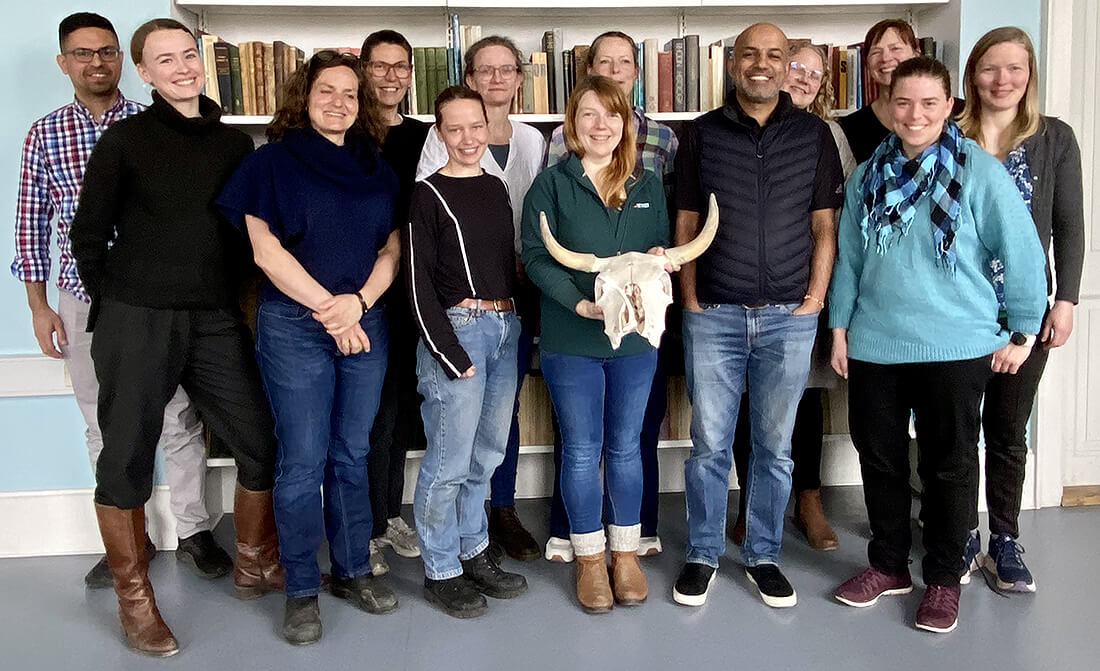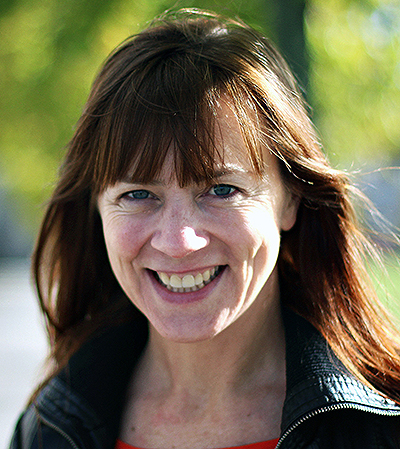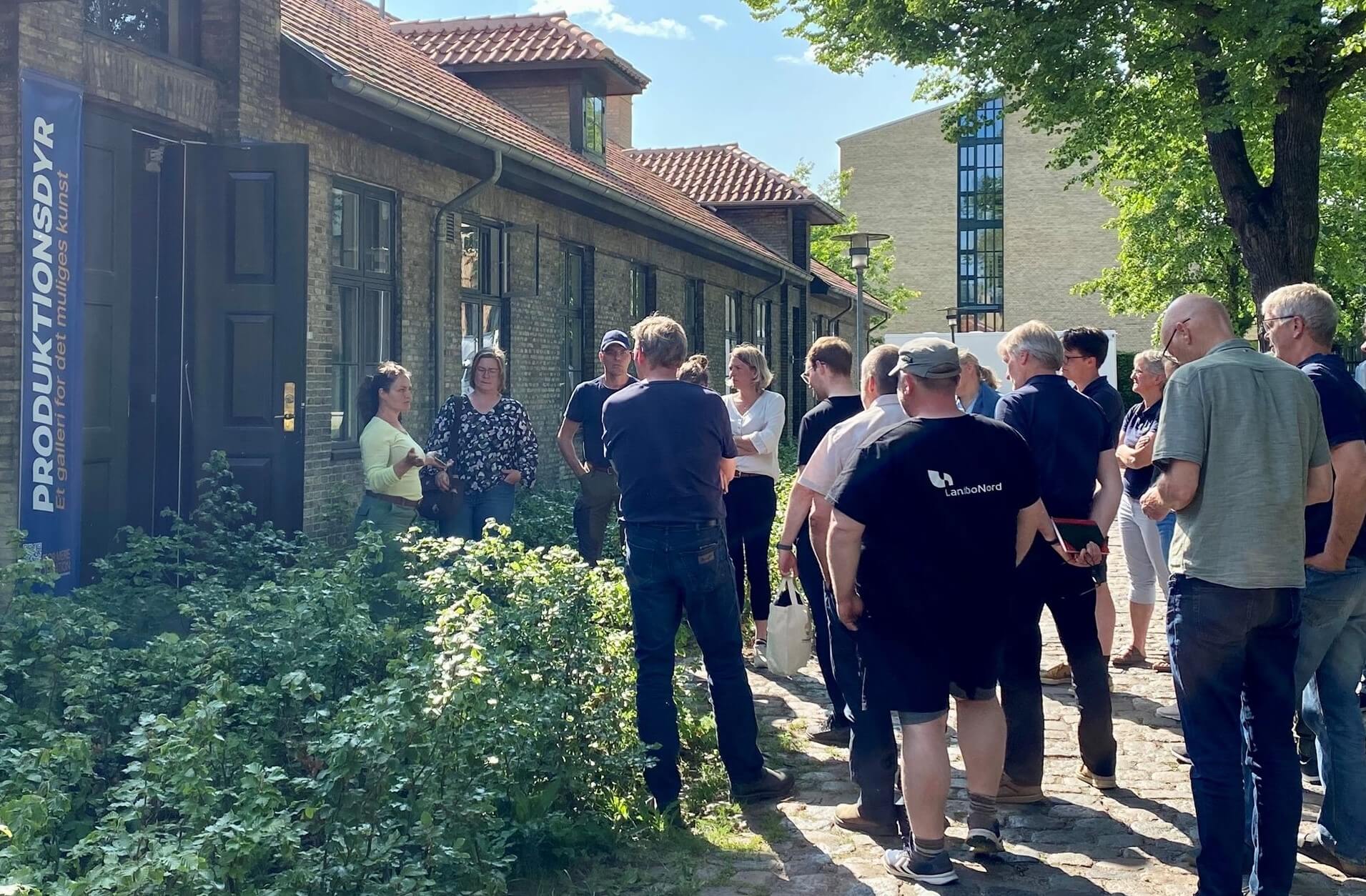The group helped organise a seminar about Exploring European-Chinese knowledge transfers in pig production at Frederiksberg Campus.
Click to watch the program and video of the presentations
Ruminants Systems and One Health (RUMIOH)

Research Group for Ruminant Systems & One Health (RUMIOH) is an interdisciplinary group of researchers, educators, and students with a shared interest in understanding ruminant lives and their ecological roles and interactions in different systems. We mainly work on cattle, and sometimes sheep and goats, and deer and bison. We also collaborate with groups working on other animal species, such as pigs, poultry, and companion animals. We also work with interactions between animals, humans and the environment including human perception, influence and decision-making in systems associated with ruminants.
We study everything from the rumen microbiome and its enzymes, over health and welfare at the individual animal and population levels, to the broader systems that ruminants are part of. This can for instance be conventional and organic dairy farms, or rosé veal (dairy-beef) calf systems, pasture-based or mixed food production systems, or systems where ruminants are kept for grazing and nature conservation purposes.
We share a concern for the current state of our planet’s health and the relations to the sustainability of systems with livestock. Therefore, we try to understand how the use, care and management of animals affect and interplay with health and wellbeing, spread of zoonoses, antimicrobial use and resistance, climate, biodiversity, soil quality, and food systems, and how to rethink the use of ruminants in the future. We aim to do so through an integrated approach to health and ecosystems, the One Health approach. Read more about how we understand the One Health approach here below.
We aim to ensure that the research, education and outreach work carried out by the OH-Sustain researchers have an impact on the full spectrum of the One Health domains, and we therefore keep in mind the definition and strive to support the key underlying principles of One Health published by the One Health High Level Expert Panel and supported by FAO, WOAH, WHO and UNEP, in PLoS Pathogens, 2022, One Health: A new definition for a sustainable and healthy future:
“One Health is an integrated, unifying approach that aims to sustainably balance and optimize the health of people, animals, and ecosystems. It recognizes the health of humans, domestic and wild animals, plants, and the wider environment (including ecosystems) are closely linked and interdependent.
The approach mobilizes multiple sectors, disciplines, and communities at varying levels of society to work together to foster well-being and tackle threats to health and ecosystems, while addressing the collective need for healthy food, water, energy, and air, taking action on climate change and contributing to sustainable development.
Key underlying principles including
- equity between sectors and disciplines;
- sociopolitical and multicultural parity (the doctrine that all people are equal and deserve equal rights and opportunities) and inclusion and engagement of communities and marginalized voices;
- socioecological equilibrium that seeks a harmonious balance between human–animal–environment interaction and acknowledging the importance of biodiversity, access to sufficient natural space and resources, and the intrinsic value of all living things within the ecosystem;
- stewardship and the responsibility of humans to change behavior and adopt sustainable solutions that recognize the importance of animal welfare and the integrity of the whole ecosystem, thus securing the well-being of current and future generations; and
- transdisciplinarity and multisectoral collaboration, which includes all relevant disciplines, both modern and traditional forms of knowledge and a broad representative array of perspectives.
Our group includes veterinarian, animal scientists, anthropologists, and an educational researcher, and we cover a wide fields of expertise including the rumen microbiome and drug discovery related to rumen physiology, animal welfare, antimicrobial use quantification, clinical bovine medicine (e.g. within udder health and calf health) and herd health research and consultancy, infectious disease epidemiology and surveillance), and methodological approaches bridging experimental trials, register data-based and observational epidemiology, and ethnographic field work. We find strength in applying both qualitative and quantitative research approaches.
Some of our research and project activities are inspired by frameworks such as the Planetary Boundaries Framework from the Stockholm Resilience Centre, the concept of absolute sustainability and new holistic ways of approaching sustainability in our modern societies (e.g. Wellbeing Economics). Rather than focusing only on optimising efficiency or the value of one or a few aspects of food production, the broad spectrum of effects and relations in the food production systems should be understood to obtain a sustainable future in which modern food production systems play a major role. This implies investigations of alternative food production methods, rethinking of future scenarios and integrated research based on mixed disciplines, i.e. veterinary and animal science working in close collaboration and exchanging staff with anthropology and ethnography as done in the Cattle Crossroads project.
Other parts of our research and services focus on epidemiological and data-analytic approaches to understanding antimicrobial use and spread of zoonotic diseases in livestock populations, as well as the legislative and communicative development and challenges related to these. We contribute to improving monitoring systems and assist colleagues in data acquisition (e.g. in the project VetStat-Kvæg) and disease control systems (e.g. the Danish Salmonella Dublin surveillance and control programme).
We also work on understanding how farmers and farming students’ work with biosecurity and disease prevention in dairy cattle farms, and the effect of biosecurity and management decisions on farms (e.g. in the EU-Horizon project BIOSECURE, and for the Salmonella Dublin working group under the Danish Veterinary and Food Administration). We collaborate with researchers, specialists and practitioners at the veterinary authorities, the livestock sector, farmers and with other research groups at University of Copenhagen and other universities.
As part of our commitment to sustainability, Associate Professor André Neves has lead a project funded by the Novo Nordisk Foundation (NNF) that in collaboration with Department of Drug Design and Pharmacology at UCPH and Max Planck Institute for Marine Microbiology in Germany, explores a novel biochemical strategy to reduce methane emissions from ruminants. This work targets a key metalloenzyme complex in archaeal microbes responsible for methane formation via hydrogen and carbon dioxide. Combining molecular modelling, synthetic chemistry, and biochemistry, the project aims to discover and test compounds that disrupt the flavin-based electron bifurcation mechanism central to methane biosynthesis. The long-term goal is to develop effective, feed-based anti-methanogenic additives, while also generating foundational knowledge on archaeal metabolism with broader implications for anaerobic microbial systems.
- Liza Rosenbaum Nielsen (Professor of Veterinary Preventive Medicine)
- Nina Dam Otten (Associate Professor of Veterinary Epidemiology and Jurisprudence)
- Nathalia Brichet (Associate Professor in Anthropology of Livestock Landscapes)
- Andre Luis Alves Neves (Associate Professor, Animal Scientist, rumen function and microbiome, drug discovery)
- Dorte Bay Lastein (Teaching Associate Professor in Veterinary Herd Health Consultancy, ruminants)
- Camilla Kirketerp Nielsen (Assistant Professor in Educational Research for One Health and Sustainability)
- Svenja Woudstra (Assistant Professor in Bovine Health Management)
- Line Svennesen (Assistant Professor, udder health and biosecurity research)
- Alice Puk Skarbye (DVM, Postdoc in Data Science and Statistical Modelling)
- Jeanette Kristensen (PhD fellow, veterinary epidemiologist and data analyst)
- Kari Bækgaard Eriksson (PhD fellow, animal scientist, alternative cattle production)
- Nadja Alsted (DVM, PhD fellow, udder health)
- Rajan Dhakal (Industrial Postdoc, employed at VILOFOSS A/S)
- Lars Pedersen (PhD fellow at University of Copenhagen, employed as Chief Consultant by SEGES Innovation)
- Røsle Dyre (Veterinary student, exhibition guide)
- Amalie Hirshals Schroll (Anthropology student, exhibition guide)
- Julie Bredsdorff Nørgaard (Veterinary student, exhibition guide)
CPHCattle seminar 2026.
The CPH Cattle Seminar is scheduled for Tuesday the 14th of April 2026. A theme for the day will be announced later, but as usual the seminar also provides insight into current cattle research at the University of Copenhagen. Further details will follow, but please save the date. Suggestions for presentations can be sent to
line.svennesen@sund.ku.dk.
ViD-konference oplæg: Fremtidens bæredygtige mælkeproduktionssystem - Cattle Crossroadsprojektet
Ved årets Videncenter for Dyrevelfærdskonference i Aarhus 19. november 2025 gav Liza Rosenbaum Nielsen en præsentation om det netop afsluttede forskningsprojekt ’Cattle Crossroads. Researching Danish livestock production for the future.’
Konferencen havde temaet "Er dyrevelfærd bæredygtigt?".
Læs mere her
Farewell breakfast for Lila Pellot
We had the pleasure of hosting agricultural engineer student Lila Pellot from Agroparistech in France (https://www.agroparistech.fr/en). She did her internship with us for the last six months in our in-vitro lab for ruminants. She participated in in-vitro rumen lab experiments, took the lead in a RUSITEC optimization trial, and participated in a demonstration for students in the course Experimental Animal Nutrition. She also had the opportunity to learn and operate the Gas Chromatography machine for analysis of methane and volatile fatty acids. We were lucky to have Lila with us. She helped us a lot, and we wish her the best for her future.
PhD defense Jeanette Kristensen, 30 October 2025 13-16
Title: Improving quantification and understanding of patterns in antimicrobial use in Danish cattle - Analyses of data from rosé veal farms.
Read more about the defense
Seminar: Initiatives to teach vet students about sustainability - with Professor Clair Firth, University of Veterinary Medicine, Vienna
The seminar will take place Wednesday the 29th of October at 4-5 pm at Grønnegårdsvej 8, lunch room.
Read more about the seminar and how to attend
Nathalia Brichet og Liza Rosenbaum Nielsen modtager Novo Nordisk Fondens tværvidenskabelige undervisningspris
Celebrating the Successful Completion of the One Health International Summer Course 2024
August 2024: Thrilled to announce the successful conclusion of this year’s One Health International Summer Course, which is offered in collaboration between Faculty of Health and Medical Sciences, UCPH and the DTU Fødevareinstituttet.
The course brought together a diverse and talented group of students from all corners of the globe, united by a shared passion for addressing the complex interconnections between human, animal, and environmental health.
Read more about this and see some photos from the course
Presentation at the annual Cattle conference in Herning
Ph.d. fellow Jeanette Kristensen will give a presentation to farmers and others interested at the annual Cattle conference in Herning. The presentation will be in Danish and will be about preliminary results from her field study where she has visited veal calf producers in Denmark to interview them and observe and discuss practices around antimicrobial use in their farms.
Ph.d. studerende Jeanette Kristensen giver oplæg om sine foreløbige feltprojektresultater fra besøg i slagtekalvebesætninger på Kvægkongressen i Herning, mandag den 26. februar 2024.
Oplægget hedder ’Kendetegn ved slagtekalveproduktioner med højt og lavt antibiotikaforbrug’
Veterinary School communication prize anno 2023
Associate professor and curator Nathalia Brichet won the Veterinary School communication prize anno 2023. The prize was announced during the New Year’s cure on the 10th of January 2024. The communication prize went to Nathalia for her widely popular dissemination of research from the Veterinary School through the exhibition "Production animals: a gallery for the art of the possible". Congratulations!!
We are happy to know that the exhibition in the room upstairs from our offices are frequently have visitors with very diverse backgrounds who come here to learn about and discuss animal farming in Denmark: https://kunet.ku.dk/nyhedsrum/nyheder/Sider/vetschool-nytaarskur-jan-2024.aspx
Veterinary students’ teaching prize 2023
Assistant professor Camilla Kirketerp Nielsen and Professor Liza Rosenbaum Nielsen won the veterinary students’ teaching prize 2023 for their work on implementing sustainability and green transition in livestock farming into a course for last year veterinary students in the One Health and Herd Health tracks. This is a great achievement that would not have happened without the inspiration and support from the Cattle Crossroads project. The prize is called “Saly’s Horse” and was handed out during the annual student party ‘Smediefesten’ on the 26th of May 2023.
Liza Rosenbaum Nielsen was speaker at the opening seminar for a new One Health Institute at University of Zurich, Switzerland on the 21st of September 2023. She now serves as member of the advisory board for the new center.
Respiratory health consequences of living close to livestock farms
VetStat-Kvæg
NEOH / Ecohealth International
COST Action ‘Biosecurity Enhanced Through Training Evaluation and Raising Awareness’ (BETTER)
Salmonella Dublin DK-Vet project (2022-2025): In this project, we have performed a case-control field study in more than 100 Danish dairy farms and are analysing the data to identify risk factors and biosecurity practices associated with the introduction and establishment of S. Dublin in test-negative dairy herds in areas with a non-negligible exposure risk. We also collaborate with the TIPTON research group on data, and design and interpretation of their models to investigate network properties over time between cattle farms in Denmark and to quantify the infection probability by considering different transmission pathways as well as a Salmonella Dublin spread model for Denmark. We will work on investigating the impact of different mitigation measures to reduce the prevalence of S. Dublin in the cattle population by considering already existing implemented mitigation measures. In this project we work together with SEGES Innovation APS, DTU and the Danish Veterinary and Food Administration.
- Mastitis meeting in Finland. November 3rd and 4th, 2025, Svenja Woudstra, Nadja Alsted and Line Svennesen (Research Group RUMINOH) attended the 7th Seminar on Nordic Mastitis Research 2025 in Tuusula. The topic was “Healthy udders through a herd health perspective”. Read more about this meeting
- Liza Rosenbaum Nielsen gav en præsentation med titlen ”Fremtidens bæredygtige mælkeproduktionssystem – Cattle Crossroads projektet” ved Fødevarestyrelsens Videncenter for Dyrevelfærdskonference. Tema: Er dyrevelfærd bæredygtigt? Aarhus, 19. november 2025. Link.
- Nathalia Brichet og Liza Rosenbaum Nielsen deltog med oplæg og i debatpanel på Den Danske Dyrlægeforenings årsmøde i København 25. oktober 2024. Det er der skrevet en artikel om, i DVT: Hvad venter os i 2050? | Dansk Veterinærtidsskrift
- "Atlet-køer" og "turbokyllinger, 4 billeder på danske landbrugsdyrs forvandling" - artikel på videnskab.dk
- På Kulturnatten 11. oktober 2024 kom 50 besøgende til rundvisning i udstillingen ’Produktionsdyr: et galleri for det muliges kunst’, der også er skrevet om i Weekendavisen og Information.
- Podcast: Dyrlægers rolle og ansvar i en bæredygtig fremtid
- On ’Kulturnatten’ (Culture night of Copenhagen) the 13th of October 2023, we greeted around 225 visitors to the exhibition ‘Production animals: a gallery for the art of the possible’
- GIV NATUREN EN STEMME - De litterære folkehøringer ved Glostrup Bibliotek med Liza Rosenbaum Nielsen som oplægsholder
- Intro-oplæg til rammesætning af paneldebatten ”Dyrlægers rolle og ansvar i forhold til en bæredygtig udvikling” v. Liza Rosenbaum Nielsen, Odeon Musiksal, Den Danske Dyrlægeforenings årsmøde 5. oktober 2023
- Da salmonelladetektiven måtte løfte blikket, Podcast-afsnit nummer 42 i ’Videnskab fra Vilde Hjerner’
- Oksekød på dagsordenen;
- Fødevarefokus - Oksens fremtid til debat: død eller levende?
- Madens folkemøde - meninger med smag
- Dansk Veterinærtidsskrift Podcast: Fremtidens grønne husdyr (16.6.2023)
- Podcast fra Bloom Festival maj 2019: Kødæderne mod planteæderne – Jens-Christian Svenning, Liza Rosenbaum, Thomas Laursen og Martin Kongstad
- Jorden Kalder Podcast #6 med Liza Rosenbaum Nielsen, 9. januar 2019
- Produktionsdyr: et galleri for det muliges kunst
- Improving sustainability through One Health approaches: an interview with Professor Rosenbaum Nielsen
- Folkemødet, Bornholm 2018: ’Er kødfesten forbi?” Oplæg og diskussion med publikum i Københavns Universitets telt, 16. juni 2018
GROUP LEADER
 Professor
Professor
Liza Rosenbaum Nielsen
E-Mail: liza@sund.ku.dk
Department of Veterinary and Animal Sciences
University of Copenhagen
Grønnegårdsvej 8, office D-18
DK-1870 Frederiksberg Campus
Denmark
COURSES
- Besætningsrådgivning og Veterinær Folkesundhed
(Bæredygtighed og kommunikation) - Besætningssundhed
- Praktisk besætningsrådgivning og kødkontrol
- Besætnings- og folkesundhed
- Retsmedicin og Forsøgsdyrskundskab
- Veterinær retsmedicin og dyrevelfærdsvurdering
- Experimental Animal Nutrition and Physiology
- Animals and Sustainability
- One Health International Summer Course
Production animals: a gallery for the art of the possible
Based on an interdisciplinary research project, the exhibition combines old research- and study collections with newly collected artefacts and works as a material archive of scientific triumphs and challenges within veterinary- and animal science, all while testifying to societal priorities in the field of livestock, both historically and contemporarily.
Read more about the exhibition

